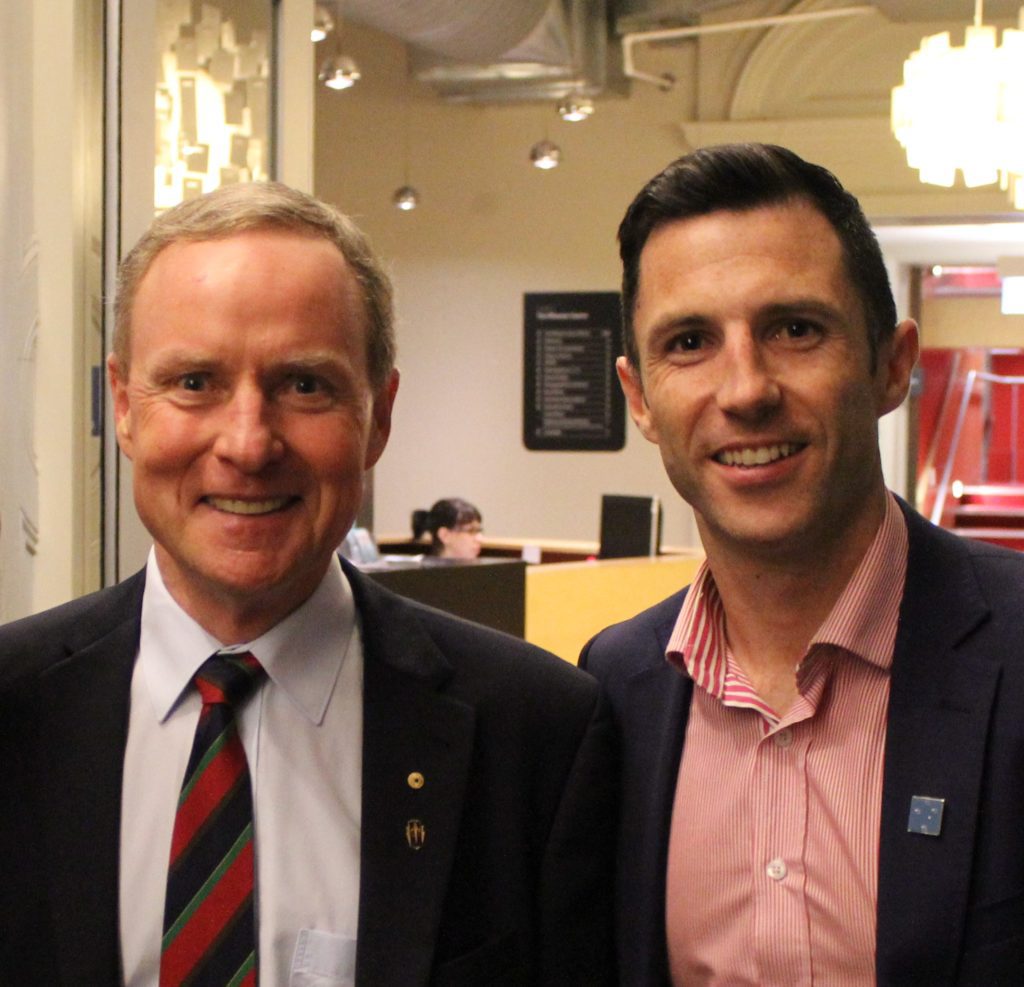Tim Mayfield with Australian of the Year, David Morrison (photo supplied)
The ANU Alumni Series
Tim Mayfield, National Director of the Australian Republic Movement
A double graduate of ANU, Tim Mayfield’s career has seen him work for the Australian Federal Police, the Department of Defence, the Department of Foreign Affairs and Trade, and as executive officer to ANU Chancellor Gareth Evans. Now at the helm of the Australian Republic Movement, we are pleased to feature Tim Mayfield in our ANU Alumni Series.
From where did you come and why did you choose ANU?
I came to ANU from Melbourne because it had 5 stars in the Universities Admissions Centre guide. Coming to ANU was as much about finding independence as it was the attraction of the institution – I’m pretty sure my school careers counsellor never even mentioned it as an option!
What else did you do (other than study) at ANU?
I joined the Army Reserve (ANU Company, Sydney University Regiment), worked at the Uni Bar (back when it was still getting good gigs) and preoccupied myself getting nowhere with multiple romantic pursuits.
What was the biggest political issue affecting you and your mates when you were at ANU and what were your views on that issue?
Voluntary Student Unionism. It was the hot button issue at universities in 2005 and I was ANUSA’s Social Officer that year. VSU was a big, national-level campaign as it affected all universities and my ANUSA Executive colleagues and I found ourselves smack bang in the middle of it.
Do you have a favourite ANU lecturer or researcher and what was it that you liked about her/him?
Jim Piscatori. He was only at the ANU briefly (as the Deputy Director of the Centre for Arab and Islamic Studies) but he was a brilliant, passionate lecturer who had genuine empathy for his students and clearly enjoyed the teaching aspect of his job (despite being an acclaimed researcher).
If you had your time over again, would you still come to ANU and study what you did?
Without a doubt, studying at ANU was one of the smartest decisions I’ve made. I love the fact that so many of the students have come from somewhere else to study in Canberra. I wish I’d finished my law degree though my two ANU qualifications have led to plenty of exciting career opportunities.
Knowing what you know now, what advice would you give your ANU student self?
All the usual stuff – drink less, study more and show up to your third year, first semester law exams (nothing worse than paying off a HECS debt for a course you never finished!).
If the Vice Chancellor called you up today and asked you to tell him one thing you think he should do to change/improve the ANU, what would it be?
Don’t forget about accessibility in the search for excellence. Attracting the best and brightest is important but so is nurturing the potential of those who deserve a brilliant education despite the adversities in their life.
You once worked for Gareth Evans, what was that like?
The ANU is fortunate to have Gareth as Chancellor – he is a masterful chair of the board. Working for him was a great, with a constant stream of top draw domestic and international policy-makers coming through the door. I learnt a huge amount about the theory and practice of international relations and the work ethic required to make it on the national/world stage.
Some people say the issue of Australia becoming a republic is just not a priority right now when bigger national conversations are happening. How do you respond to that?
Australia didn’t become the great nation that it is by avoiding nation-building reform, we became great by embracing it. At every step in Australia’s history, there have been pressing issues to confront, but this has never been an excuse for turning our back on questions of national identity. If anything, our politicians have been guilty in recent times of taking on too little, not too much. Becoming a republic will be a powerful statement to ourselves and the world that Australia is a truly multicultural, egalitarian society with a history of thousands, not hundreds of years.
Who, in your opinion, is the most under-rated Australian and why?
Susan Ryan. Susan has been a trailblazer her whole life (including as a single mum completing her masters at ANU!). From serving as one of the first female ministers in our federal parliament to her recent stint as Australia’s Age Discrimination Commissioner, she has been a formidable advocate for disempowered Australians.
We acknowledge the Ngunnawal and Ngambri people, who are the Traditional Custodians of the land on which Woroni, Woroni Radio and Woroni TV are created, edited, published, printed and distributed. We pay our respects to Elders past and present. We acknowledge that the name Woroni was taken from the Wadi Wadi Nation without permission, and we are striving to do better for future reconciliation.
